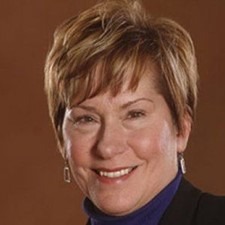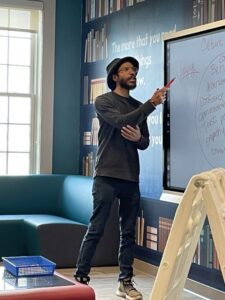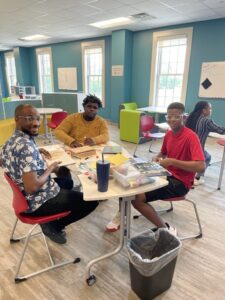
With literacy rates as low as they are nationwide, especially for younger people, any way to help increase them is as important as ever. Getting through to them at a young age is key. The Literacy Center at Augusta University is using all the tools at their disposal to do just that.
One way to spark students’ interest is through poetry. Over the past seven months, the center hosted a poet in residence to help the students.

Betsy VanDeusen, PhD, director of the Literacy Center, said the center already incorporates poetry in the lessons but wanted to formalize it to have the poet in residence. With the help from a grant by the Community Foundation of the CSRA, they were able to fund the program and bring in Marquice Williams from Savannah to teach using spoken word poetry.
“Poetry helps kids because it’s short yet has great vocabulary and language-teaching opportunities,” said VanDeusen. “It’s not as structured; it’s phrased and it helps kids with fluency.”
VanDeusen met Williams through the Georgia Poetry Society and developed a connection that led him to coming to Augusta once or twice a month.
Williams’ passion for poetry started at an early age, and he loves to teach others. He understands there’s an initial hurdle to clear as most people hear the word poetry and think of the classics that might not interest them at all.

“It’s always interesting when you say ‘poetry.’ The first thing you think of is page poetry, you think of Shakespearean or poetry that is so far removed from you that you just can’t connect to it or understand what’s going on,” Williams said. “What I really had fun with was watching their faces change from saying, ‘Hey, I do poetry’ and then actually hearing me do poetry. They’re like, ‘That’s almost like rap.’ Well, let’s talk about rap. What does rap stand for? Rap stands for rhythm and poetry. That was the a-ha moment.”
Williams added that he asked the students how many think they are poets. At first, nobody raised their hand. But after explaining what poetry is and asking again, all of the students raised their hands.
He’s also big on letting the youth tell their story as they are the “experts” since they are living it at the moment. Many times they are not given the space to tell their stories, but when given the chance, they end up surprising the teachers, including Williams.
“You can tell they’ve been through some really amazing things, and, while they may be younger, their mindsets are well beyond some adults even. If we allow our young people to really speak and strengthen their voices, we start to find out who they really are.”
Through spoken word poetry, Williams has seen a change in many students from the start of his classes.
“I really think it’s just given them the confidence to speak up for themselves and to live unapologetically in their story,” Williams said.
He added it’s important to listen to the young people and realize that you can say something, but each person may perceive it in a different way. It’s why when they are working on stuff, he visits each young person to see where their mind is. More often than not, they end up inspiring him, and he’s sure to let them know that, which helps their confidence level.
Williams uses prompts in his teaching, which allows the young students to interact with the prompts and encourages freedom in their writing.
“I come in here and tell them this is free verse. Free verse means that you can do literally anything you want. When I give a prompt, if you want to write a song, you can write a song. If you want to create a rap, you can create a rap. If you want to tell a story, you can tell a story. Again, that puts the power in their hands and lets them know they are the world builders at the end of the day.”
While this may be a new way to think about poetry, Williams knows it’s important to honor the texts and poets from other generations. It shows the students there are different styles of poetry, but they can find a way to be in a conversation with literary writers and literary giants like Shakespeare.
He does that by taking current, established poems and crossing out some lines while keeping others to create a poem inside a poem.
“We’re finding a way to still interact with these literary giants from back in the day who are accepted in the educational institutions.”

Williams has also found the work goes beyond the classroom.
“It reminds me how important this work is because of hearing what the mentors say about them taking these prompts, but also having the students come up to me afterwards and say, ‘Hey, I took this prompt home, and I kept writing on it and I want to share this with you.’ So this doesn’t stop in this room; it carries out in the world with them,” said Williams.
Williams is 30 years old, and the smaller age gap between him and the students helps him relate to them a little better. He also pays close attention to all of them and their mannerisms in the classroom.
“I’m usually very hyper-focused because, like I tell them, I’m trying to learn from you too. We don’t just speak through language and through words. We also speak with body language. I understand they are able to pick up on body language as well, so I want to give them the same body language or communicate the same thing that I want them to communicate to me when I’m speaking or I’m up here,” added Williams.
“Kids can tell when people are paying attention, really paying attention to them. And Marquice really pays attention to them, and he does that from the minute he meets them. There’s nothing more valuable to a kid than an adult paying really quality attention,” said VanDeusen.
